KIA Niro: Heating, Ventilation And Air Conditioning / Troubleshooting
Problem Symptoms Table
Before replacing or repairing air conditioning components, first determine if the malfunction is due to the refrigerant charge, air flow or compressor.
Use the table below to find the cause of the problem. The numbers indicate the priority of the likely causes of the problem. Check each part in order. If necessary, replace the relevant parts.
After correcting the malfunction, check the complete system to ensure that performance is satisfactory.
Standard:
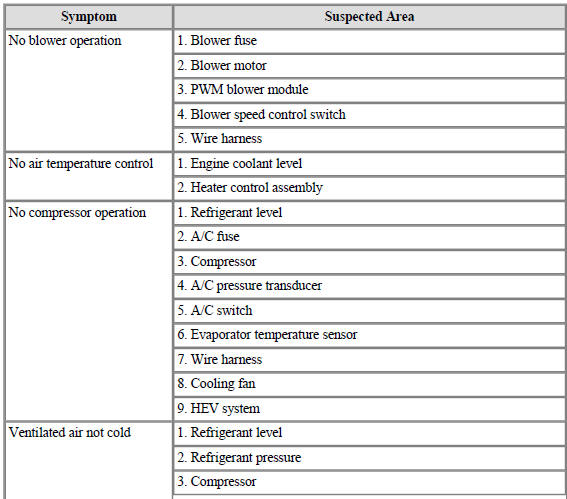
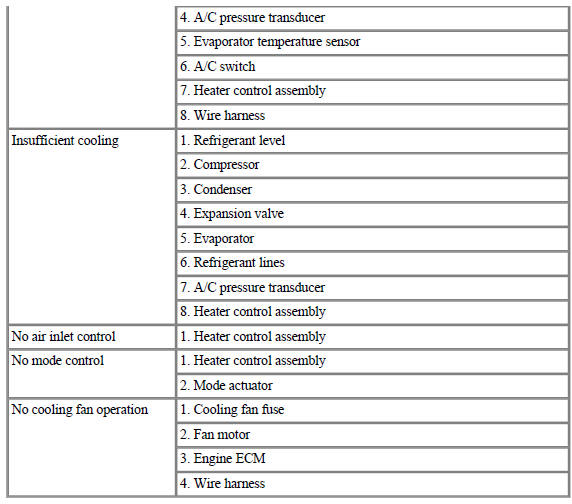
Symptom:
No blower operation
Suspected Area:
- Blower fuse
- Blower motor
- PWM blower module
- Blower speed control switch
- Wire harness
Symptom:
No air temperature control
Suspected Area:
- Engine coolant level
- Heater control assembly
Symptom:
No compressor operation
Suspected Area:
- Refrigerant level
- A/C fuse
- Compressor
- A/C pressure transducer
- A/C switch
- Evaporator temperature sensor
- Wire harness
- Cooling fan
- HEV system
Symptom:
Ventilated air not cold
Suspected Area:
- Refrigerant level
- Refrigerant pressure
- Compressor
- A/C pressure transducer
- Evaporator temperature sensor
- A/C switch
- Heater control assembly
- Wire harness
Symptom:
Insufficient cooling
Suspected Area:
- Refrigerant level
- Compressor
- Condenser
- Expansion valve
- Evaporator
- Refrigerant lines
- A/C pressure transducer
- Heater control assembly
Symptom:
No air inlet control
Suspected Area:
- Heater control assembly
Symptom:
No mode control
Suspected Area:
- Heater control assembly
- Mode actuator
Symptom:
No cooling fan operation
Suspected Area:
- Cooling fan fuse
- Fan motor
- Engine ECM
- Wire harness
Specification
Air Conditioner
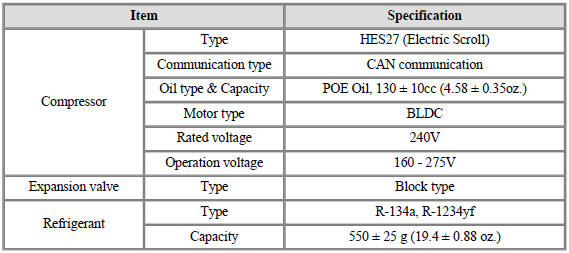
Blower Unit

Heater and Evaporator Unit

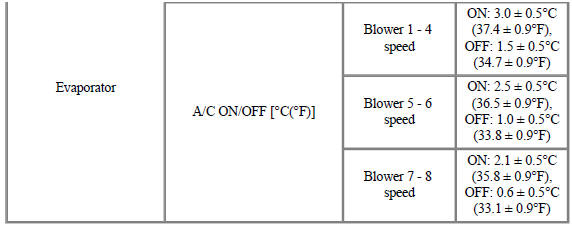
Tightening Torques
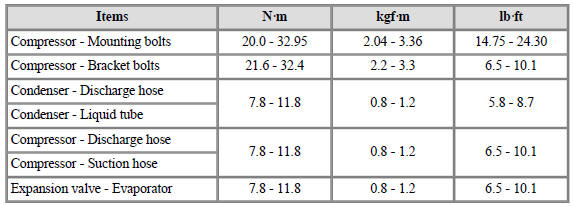
READ NEXT:
 Air Conditioning System / General Safety Information and Caution
Air Conditioning System / General Safety Information and Caution
Instructions (R- 134a)
When Handling Refrigerant
R-134a liquid refrigerant is highly volatile. A drop on the skin of your
hand could result in localized
frostbite. When handling the refrigerant, be sure to wear gloves.
It is standard prac
 Air Conditioning System / Repair Procedures
Air Conditioning System / Repair Procedures
Checking Refrigerant Specifications
Check refrigerant specifications label inside engine room.
Examples
R-134a
R-1234yf
If refrigerant specifications label is not visible, check the
refrigerant service port diameter.
High
pressu
SEE MORE:
 Pre-Charge Resistor
Pre-Charge Resistor
Specification
Description
Pre-Charge Resistor is integrated into the Power Relay Assembly (PRA). It
protects the high voltage circuit by limiting the
current while the inverter capacitor is being charged.
PRA Operation Sequence
Cir
 Outside Rear View Mirror
Outside Rear View Mirror
Outside rear view mirror
Outside Rear View Mirror Repair procedures
Replacement
Warning
Put on gloves to protect your hands.
Warning
Use a plastic panel removal tool to remove interior trim pieces
without marring the surface.
B
Categories
- Home
- KIA Niro EV, Hybrid - Second generation - (SG2) (2021-2024) - Owner's manual
- Kia Niro - First generation - (DE) (2017-2022) - Service and Repair Manual
- Contact Us
